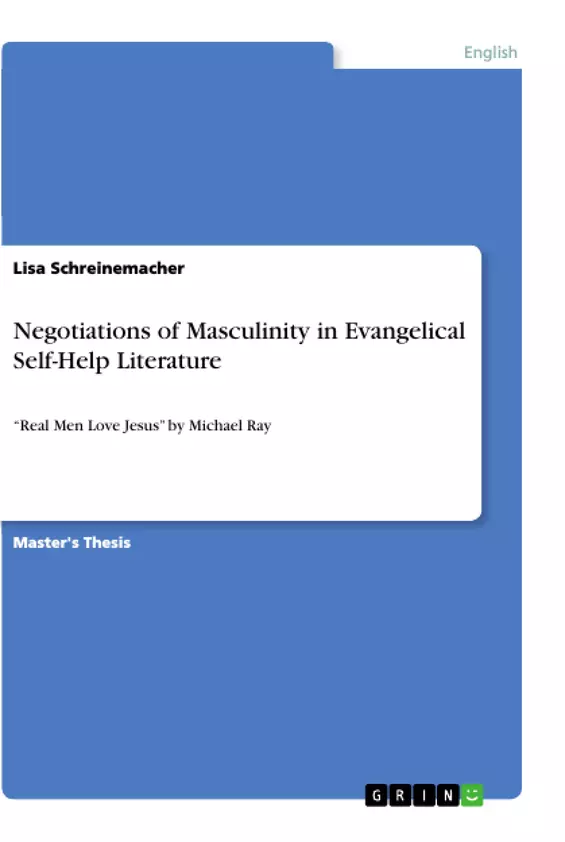Evangelical culture is permeated with interpretations of masculine and feminine ideals. This thesis aims to identify negotiations of masculinity in evangelical self-help literature, which presents an underrated genre and has received considerably less attention by other scholars. The author argues that ‘traditional’ characteristics of masculinity, such as strength, aggression and assertiveness are promoted in the selected self-help manuals under the pretext of bible teachings. In expressing these concerns the author tries to respect the writers’ faith and their commitment to the Bible as the ultimate authority.
With his song Real Men Love Jesus, Michael Ray probably speaks from the heart of all Evangelicals. He sings of several activities that ‘real man’ like to enjoy, such as football, fishing, cars and of course praying. The author chose the title of his song for the thesis, because it represents the common ground for all negotiations of masculinity within evangelical self-help literature, that ‘real men love Jesus.’
Inhaltsverzeichnis (Table of Contents)
- Introduction: Why Evangelical Men Really Love Jesus...
- Men As Providers
- What Wives Wish Their Husbands Knew About Women
- Characteristics of a Man.
- What Is Wrong With Men?
- How to Make Your Wife Happy.
- Tender Warrior
- The Pillar of the King.
- The Pillar of the Warrior.
- The Pillar of the Mentor.
- The Pillar of the Friend
- Wild at Heart.
- A Battle to Fight.
- An Adventure to Live.
- A Beauty to Rescue.
Zielsetzung und Themenschwerpunkte (Objectives and Key Themes)
This thesis aims to identify and analyze the negotiation of masculinity in evangelical self-help literature. It examines how these texts shape the definition of manhood within evangelical culture, focusing on the period from the 1970s to the present. The thesis explores the ways in which evangelical spokespersons and authors promote masculine ideals, specifically investigating how these ideals contribute to a hostile attitude towards sexual minorities and perpetuate the oppression of women.
- The construction of masculinity in evangelical self-help literature.
- The influence of historical and cultural events on changing ideals of masculinity within evangelicalism.
- The promotion of "traditional" masculine characteristics, such as strength, aggression, and assertiveness, in evangelical self-help books.
- The potential for these texts to foster hostility towards sexual minorities and maintain the subordination of women.
- The role of the Bible as a source of authority in shaping these masculine ideals.
Zusammenfassung der Kapitel (Chapter Summaries)
The introduction provides an overview of the topic and the significance of the chosen title, “Real Men Love Jesus,” which highlights the central theme of negotiating masculinity within evangelical self-help literature. The introduction also introduces the concept of evangelicalism and its core theological standpoints, emphasizing the importance of understanding this religious foundation for interpreting the selected self-help books.
Chapter 2, titled “Men As Providers,” delves into the traditional role of men as providers and examines the perspectives on this role within evangelical self-help literature. It analyzes what wives desire from their husbands and explores the characteristics expected of a man, addressing the perceived shortcomings of men and providing advice on how to achieve marital happiness.
Chapter 3, “Men As Tender Warriors,” explores the concept of the “Tender Warrior,” examining different aspects of this ideal, such as the pillars of the king, warrior, mentor, and friend. This chapter delves into the complexities of combining strength and tenderness within the framework of evangelical masculinity.
Chapter 4, “Men As Dangerous Warriors,” focuses on the more aggressive side of masculinity, exploring the concept of the “Wild at Heart” as it is presented in evangelical self-help literature. It analyzes the themes of battle, adventure, and rescue within this context, further examining the dynamics of masculinity within evangelical culture.
Schlüsselwörter (Keywords)
The central focus of this thesis lies on understanding the negotiation of masculinity in evangelical self-help literature. It examines the influence of American evangelicalism, focusing on its core theological beliefs and the role of the Bible as a source of authority. The research explores how these texts promote "traditional" masculine characteristics such as strength, aggression, and assertiveness, while also investigating the potential impact of these ideals on the treatment of sexual minorities and the perpetuation of women's oppression. Key terms and concepts include evangelicalism, masculinity, gender roles, self-help literature, Christian values, and the Bible.
Frequently Asked Questions
What is the main goal of the thesis on evangelical masculinity?
The thesis aims to identify and analyze how masculinity is negotiated and defined within evangelical self-help literature from the 1970s to the present.
What does the title "Real Men Love Jesus" represent?
It represents the common ground in evangelical culture that true manhood is rooted in a relationship with Jesus, often combining traditional masculine traits with faith.
How is the "Tender Warrior" concept defined?
It is a masculine ideal that attempts to combine strength and aggression with tenderness and emotional availability, often categorized into roles like king, warrior, mentor, and friend.
What are the characteristics of the "Wild at Heart" ideal?
Based on John Eldredge's work, it promotes the idea that every man has a "battle to fight, an adventure to live, and a beauty to rescue."
Does evangelical self-help literature influence gender roles?
Yes, the author argues that these texts often promote traditional traits like assertiveness and strength, which can perpetuate the subordination of women and hostility toward sexual minorities.
What role does the Bible play in these self-help books?
The Bible is treated as the ultimate authority, and masculine ideals are promoted under the pretext of biblical teachings.
- Quote paper
- Lisa Schreinemacher (Author), 2020, Negotiations of Masculinity in Evangelical Self-Help Literature, Munich, GRIN Verlag, https://www.grin.com/document/937318



